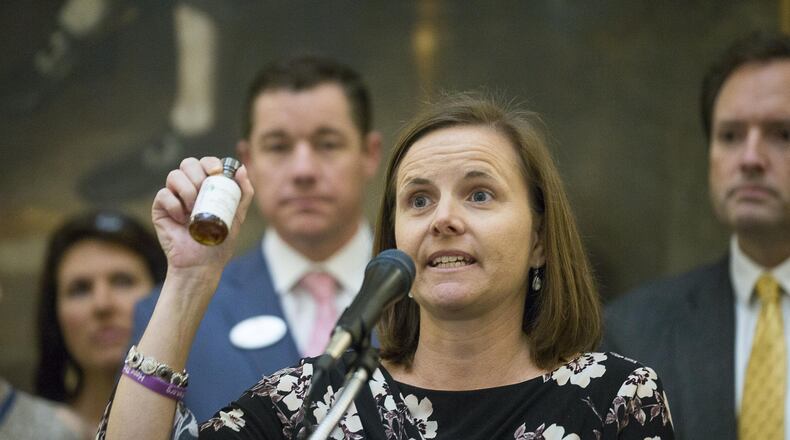Legislation filed Thursday would allow medical marijuana oil to be sold to patients in Georgia.
The proposal calls for medical marijuana dispensaries to serve the state's rising number of registered patients — more than 8,400 so far. The drug would be legally grown, manufactured, tested, tracked and distributed for the first time if House Bill 324 passes.
The bill is the next step for Georgia’s medical marijuana program, which since 2015 has permitted patients to possess and use marijuana with less than 5 percent THC, the main psychoactive component of the cannabis plant.
But it remains illegal to buy, sell or transport the drug.
State Rep. Micah Gravley, the sponsor of the bill, says that needs to change.
“The problem is that there’s nowhere to purchase the oil here in the state of Georgia,” said Gravley, a Republican from Douglasville. “We know it’s beneficial. We’ve seen seizures reduced, we’ve seen the easing of the effects of Parkinson’s, cancer, (multiple sclerosis), Crohn’s, sickle cell anemia and autism.”
The bill’s prospects are uncertain in the Georgia General Assembly, but the proposal has bipartisan support from members of the state’s Republican majority as well as many Democrats.
If approved, Georgia would join 31 states that already allow some form of marijuana cultivation, according to the Joint Commission on Low THC Medical Oil Access, a group of lawmakers and stakeholders that recommended licensing marijuana growers, manufacturers and dispensaries.
The bill is opposed by those who fear it will eventually lead to outright legalization of marijuana for recreational use. They say the drug is unsafe and its health benefits are overstated.
“Cultivation is the kiss of death. It leads to full legalization,” said Sue Rusche, the president and CEO of National Families in Action, which is based in Atlanta. “Every state that has legalized marijuana for recreational use began with legalizing cultivation of marijuana for medical use.”
Parents of children who use medical marijuana for various illnesses came to the Capitol on Thursday to support the bill, saying it’s long overdue.
Julie Denton said her 9-year-old son, Christian, has dramatically improved since he started taking medical marijuana to treat his genetic disorder, Kabuki syndrome. The oil helps him focus, communicate, remain calm and sleep through the night, she said.
“We shouldn’t have to worry about what we’ll do if we run out,” said Denton, who lives in Kennesaw. “There should be an easy way to get it.”
Georgia’s medical marijuana law covers 16 conditions, including severe seizures, deadly cancer, peripheral neuropathy and multiple sclerosis. Patients who register with the state are protected from criminal prosecution for possessing up to 20 fluid ounces of low-THC oil.
Last year, the General Assembly added post-traumatic stress disorder and intractable pain to the list of conditions eligible for treatment by cannabis oil.
Republican Gov. Brian Kemp has left open the possibility for in-state cultivation of medical marijuana.
“I sympathize and empathize with them on that issue, and I support research-based expansion,” Kemp said last month in an interview on Georgia Public Broadcasting. “Thankfully, there is some research that’s going on in this field that will give us some good data that will kind of tell us how to move forward.”
The legislation proposes that the state license a total of 60 medical marijuana dispensaries, split between large growers and distributors, smaller-scale companies and stand-alone retailers.
Initial licenses would cost at least $150,000 for large companies, $37,500 for smaller companies and $30,000 for retailers. Businesses would also have to pay annual license renewal fees ranging from $10,000 to $50,000.
Licenses would be approved by Jan. 1, 2020, and state-sanctioned medical marijuana products would be available to patients within 12 months of the license date.
Stay on top of what's happening in Georgia government and politics at ajc.com/news/georgia-government/.
About the Author
Keep Reading
The Latest
Featured






